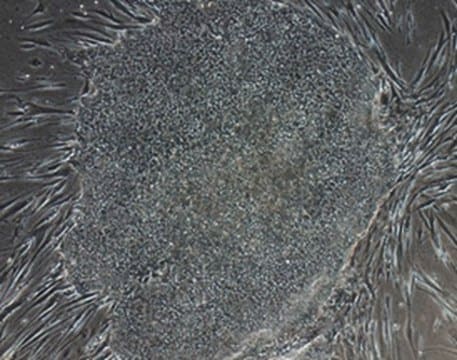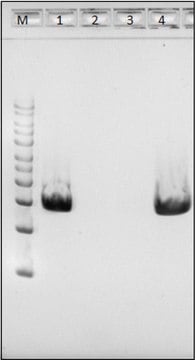SCR714M
Human OKSG-cMyc TagRFP Simplicon RNA
Zaloguj sięWyświetlanie cen organizacyjnych i kontraktowych
About This Item
Kod UNSPSC:
12352207
eCl@ss:
32161000
NACRES:
NA.81
Polecane produkty
metody
nucleic acid detection: suitable (RNA)
Poziom jakości
Opis ogólny
EMD Millipore’s Simplicon® OKSG-cMycTagRFP RNA is a safe and efficient method to generate integration free, virus-free human iPS cell using a single transfection step of self-replicating synthetic RNA for Oct4, Klf4, Sox2, Glis1 and c-Myc along with a red fluorescent protein (TagRFP).
Zastosowanie
Advantages of the Simplicon OKSG-cMyc TagRFP RNA:
• Integration-free, footprint-free iPSCs generation. No risk of genomic integration.
• Safe, virus-free, synthetic polycistronic RNA replicon (all five reprogramming factors in a single RNA strand)
• TagRFP reporter gene construct embedded in the RNA replicon that allows visualization and quantification of the transfection efficiency of the Simplicon RNA.
• Only one single transfection required. The RNA replicon is able to self-replicate, eliminating the need for additional daily transfections of multiple individual mRNAs over a 14-day period.
• Efficient and rapid reprogramming.
• No screening required to ensure the absence of viral remnants.
• Controlled elimination of synthetic VEE RNA replicon by the removal of B18R protein.
• Validated for reprogramming in feeder-free and feeder-based culture conditions.
• The OKSG-cMyc transgenes are especially useful for iPSCs generation from somatic cells that are more difficult to reprogram (i.e. slower proliferating cells or aged somatic cells) while the TagRFP provides a rapid assessment of transfection efficiency. Presence of the TagRFP transgene also allows for optimization of the transfection conditions in hard- to- transfect somatic or primary cells.
• Integration-free, footprint-free iPSCs generation. No risk of genomic integration.
• Safe, virus-free, synthetic polycistronic RNA replicon (all five reprogramming factors in a single RNA strand)
• TagRFP reporter gene construct embedded in the RNA replicon that allows visualization and quantification of the transfection efficiency of the Simplicon RNA.
• Only one single transfection required. The RNA replicon is able to self-replicate, eliminating the need for additional daily transfections of multiple individual mRNAs over a 14-day period.
• Efficient and rapid reprogramming.
• No screening required to ensure the absence of viral remnants.
• Controlled elimination of synthetic VEE RNA replicon by the removal of B18R protein.
• Validated for reprogramming in feeder-free and feeder-based culture conditions.
• The OKSG-cMyc transgenes are especially useful for iPSCs generation from somatic cells that are more difficult to reprogram (i.e. slower proliferating cells or aged somatic cells) while the TagRFP provides a rapid assessment of transfection efficiency. Presence of the TagRFP transgene also allows for optimization of the transfection conditions in hard- to- transfect somatic or primary cells.
Inne uwagi
Concentration: Please refer to lot specific datasheet.
Informacje prawne
SIMPLICON is a registered trademark of Merck KGaA, Darmstadt, Germany
Oświadczenie o zrzeczeniu się odpowiedzialności
Unless otherwise stated in our catalog or other company documentation accompanying the product(s), our products are intended for research use only and are not to be used for any other purpose, which includes but is not limited to, unauthorized commercial uses, in vitro diagnostic uses, ex vivo or in vivo therapeutic uses or any type of consumption or application to humans or animals.
This page may contain text that has been machine translated.
Kod klasy składowania
12 - Non Combustible Liquids
Temperatura zapłonu (°F)
Not applicable
Temperatura zapłonu (°C)
Not applicable
Certyfikaty analizy (CoA)
Poszukaj Certyfikaty analizy (CoA), wpisując numer partii/serii produktów. Numery serii i partii można znaleźć na etykiecie produktu po słowach „seria” lub „partia”.
Masz już ten produkt?
Dokumenty związane z niedawno zakupionymi produktami zostały zamieszczone w Bibliotece dokumentów.
Nasz zespół naukowców ma doświadczenie we wszystkich obszarach badań, w tym w naukach przyrodniczych, materiałoznawstwie, syntezie chemicznej, chromatografii, analityce i wielu innych dziedzinach.
Skontaktuj się z zespołem ds. pomocy technicznej






